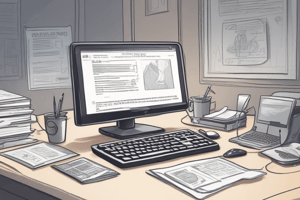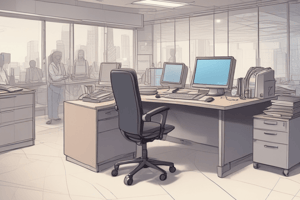Podcast
Questions and Answers
According to the Clear Desk Policy, a clear desk refers to a workstation where all sensitive information is visible and easily accessible.
According to the Clear Desk Policy, a clear desk refers to a workstation where all sensitive information is visible and easily accessible.
False (B)
The purpose of the Clear Desk Policy is to ensure the protection of company assets, prevent unauthorized access to sensitive information, and maintain an organized work environment.
The purpose of the Clear Desk Policy is to ensure the protection of company assets, prevent unauthorized access to sensitive information, and maintain an organized work environment.
True (A)
The Clear Desk Policy applies only to permanent employees and not contractors or consultants.
The Clear Desk Policy applies only to permanent employees and not contractors or consultants.
False (B)
Version 0.1 of the Clear Desk Policy document is marked as final and not a draft.
Version 0.1 of the Clear Desk Policy document is marked as final and not a draft.
Erasing shared surfaces is one of the requirements stated in the Clear Desk Policy.
Erasing shared surfaces is one of the requirements stated in the Clear Desk Policy.
Sensitive Information is defined as any information that could result in financial gain for the company if compromised.
Sensitive Information is defined as any information that could result in financial gain for the company if compromised.
All employees are responsible for ensuring adherence to the Clear Desk Policy.
All employees are responsible for ensuring adherence to the Clear Desk Policy.
Managers are not required to enforce the Clear Desk Policy within their respective teams.
Managers are not required to enforce the Clear Desk Policy within their respective teams.
Employees are not required to clear their desks of sensitive information at the end of each workday.
Employees are not required to clear their desks of sensitive information at the end of each workday.
Printouts should be securely stored in unlocked filing cabinets or drawers.
Printouts should be securely stored in unlocked filing cabinets or drawers.
Employees should not use 'shred and dispose' bins for the proper disposal of confidential documents.
Employees should not use 'shred and dispose' bins for the proper disposal of confidential documents.
Screensavers should be set to activate after a minimum of 10 minutes of inactivity.
Screensavers should be set to activate after a minimum of 10 minutes of inactivity.
Employees must lock their computers or laptops with passwords whenever they step away from their desks momentarily.
Employees must lock their computers or laptops with passwords whenever they step away from their desks momentarily.
Employees are not required to erase or remove any sensitive information on shared surfaces after use.
Employees are not required to erase or remove any sensitive information on shared surfaces after use.
Managers have no role in inspecting workstations for compliance with the Clear Desk Policy.
Managers have no role in inspecting workstations for compliance with the Clear Desk Policy.
Incident reporting related to breaches of the Clear Desk Policy should be directed to the HR department.
Incident reporting related to breaches of the Clear Desk Policy should be directed to the HR department.




